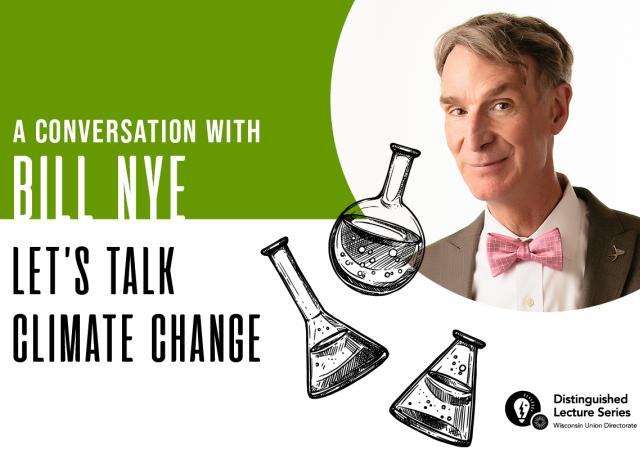Join WUD DLS for Let's Talk Climate Change, A Conversation with Bill Nye on Monday, April 25th at 7:00 p.m. The one-hour conversation/lecture is open and FREE to both students and the public, and will end with a 30-minute Q&A. This is an in-person event with a livestream option available for those who cannot attend.
In-Person Ticket Details -
Tickets are free, but required. Get your tickets at tiny.cc/bill-nye. Tickets are also available at Memorial Union Box Office (1st floor). Please bring a printed ticket to the venue. Mobile tickets are not accepted.
- UW-Madison Student Presale: Student presale has ended.
- Public Tickets: SOLD OUT. If you are interested in attending the event, please sign up for the livestream (link below).
Virtual Livestream Details
- Registration is required to access the livestream. Register NOW at tiny.cc/bill-nye-virtual.
Questions?
Please contact dls@union.wisc.edu.
About the Speaker
Bill Nye is an American science educator, engineer, comedian, television presenter, author, and inventor, with a mission to help foster a scientifically literate society and to help people everywhere understand and appreciate the science that makes our world work. Making science entertaining and accessible is something Bill has been passionate about his entire life. Bill quit his engineering day job and made the transition to a night job as a comedy writer and performer on Seattle’s homegrown ensemble comedy show “Almost Live” in 1986. This is where “Bill Nye the Science Guy®” was born. The show appeared before Saturday Night Live and later on Comedy Central, originating at KING–TV, Seattle’s NBC affiliate. Bill made a number of award–winning shows, including the show he became so well known for, Bill Nye the Science Guy. While working on the Science Guy show from 1992-1998, Bill won seven national Emmy Awards for writing, performing, and producing. The show won 18 Emmys in five years. To commemorate the series, the Bill Nye The Science Guy original lab coat is on display at the “T is for Television” exhibit in the Smithsonian National Museum of American History.
Bill strongly believes the most effective way to reduce the world’s human population of people over the next several decades is to raise the standard of living for women and girls. To do that, he says, we need to educate people as effectively as possible. Bill wrote and produced “Solving for X,” a series on DVD where he shows us how to do algebra along with the P, B, & J – the Passion, Beauty, and Joy – of math. It turns out that algebra is the most reliable indicator of whether or not a student will end up pursuing a career in science.
After joining as a Charter Member in 1980, Bill is now the CEO of the Planetary Society, the world’s largest space-interest group. Under his leadership, the non-for-profit Society is growing and becoming more influential having members in 130 countries. Cofounded by Carl Sagan, Bruce Murray and Louis Friedman, the organization’s mission is to empower the world’s citizens to advance space science and exploration.
In 2017, Bill was a co-chair in the inaugural March for Science, a series of rallies and marches held in Washington, D.C., and more than 600 other cities across the world on Earth Day. In the same year, Bill was the subject of the critically acclaimed documentary Bill Nye: Science Guy which premiered at SXSW. The documentary focuses on Bill’s life and his mission to stop the spread of anti-scientific thinking across the world. Bill returned to television with the release of his new series Bill Nye Saves The World which debuted on Netflix in April 2017. On the show, Bill explores various problems and misconceptions from a scientific point of view, refuting myths and claims that rebuke science.

